| Srl | Item |
| 1 |
ID:
105238
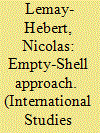

|
|
|
|
|
| Publication |
2011.
|
| Summary/Abstract |
State-building under the aegis of international administrations has faced various hurdles and obstacles in Kosovo and Timor-Leste-failures that came to full light in March 2004 in Kosovo and in May 2006 in Timor-Leste. However, the international conception buttressing the set up of international administrations-I dub it the "empty-shell" approach-is still present in certain policy circles. This article aims to analyze this international conception by clarifying how the UN came to impose its authority over the two territories in a very similar process. While the literature on each state-building experiment is vast and compelling, few authors have attempted to contrast the two case studies, especially regarding the mental conception informing the governance process of these territories since 1999. This article links the empty-shell approach with the delegitimization process that came to be experienced by the UN in both cases. The article describes the international policies put in place by the UN to expand its control over the two territories, a mix of co-option of local elites and the marginalization of the local population. Finally, the article reveals some possible solutions in order to avoid the more blatant difficulties pertaining to state-building conducted from the outside-in.
|
|
|
|
|
|
|
|
|
|
|
|
|
|
|
|
| 2 |
ID:
144050
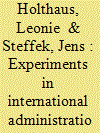

|
|
|
|
|
| Summary/Abstract |
In this article, we reintroduce the political thought of James Arthur Salter (1881–1975), a British diplomat, politician, and university professor, who made a seminal contribution to the emergence of International Relations theory in the interwar years. His academic writings were informed by his professional engagement with the Allied Maritime Transport Council (AMTC) during the First World War and the technical branches of the League of Nations. Salter promoted a distinctly transgovernmental form of expert cooperation in international advisory bodies connected to national ministries. His vision of a depoliticised transnational expertocracy inspired various IR functionalists, not least David Mitrany. Salter suggested such forms of governance also for British national politics, drawing what we call here an ‘international analogy’. His work illustrates very well how the emergence of IR theory was connected to broader trends in political theory, in particular in efforts at adapting democracy to the increasing complexities of industrial modernity.
|
|
|
|
|
|
|
|
|
|
|
|
|
|
|
|
| 3 |
ID:
069775
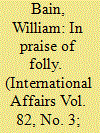

|
|
|
| 4 |
ID:
088124
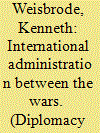

|
|
|
|
|
| Publication |
2009.
|
| Summary/Abstract |
This article traces the chronology of the interwar decline of European influence and power, arguing that its origins outside Europe are to be found as much in the paradoxical status of international administration of colonial and post-colonial areas as in the direct challenges posed to European stability by revisionist states in the early 1930s. It demonstrates that an inherent ambivalence toward the interwar colonial world and its relationship to Europe presaged and conditioned the collapse of Europe's own balance of power.
|
|
|
|
|
|
|
|
|
|
|
|
|
|
|
|
| 5 |
ID:
044938
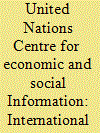

|
|
|
|
|
| Publication |
New York, UNCESI, 1970.
|
| Description |
27p.
|
|
|
|
|
|
|
|
|
|
|
|
Copies: C:1/I:0,R:0,Q:0
Circulation
| Accession# | Call# | Current Location | Status | Policy | Location |
| 006507 | 354.103/UND 006507 | Main | On Shelf | General | |
|
|
|
|
| 6 |
ID:
060802


|
|
|
|
|
| Publication |
2005.
|
| Summary/Abstract |
This article examines the practices of governance enacted within the framework of the international administration of Kosovo, which was established in 1999. I analyse the complex interplay between power and the liberal-democratic norms around which the UN-led mission defined its role in the province. The international administration exercised significant power in the legal/institutional reconstruction of the province, and in its systematic attempts to socialise Kosovars into accepting Western-based norms of liberal democracy as the only reasonable foundation of their polity. At the same time, however, the norms advocated by the international administration proved to be the source of a certain degree of power for the people of Kosovo. Specifically, those norms provided the framework within which Kosovars were able to criticise the international administration, and to claim the right to greater participation in decisions regarding the province. Over the past couple of years, Kosovo has witnessed the emergence of a shared normative framework within which the international administrators and Kosovar political elites articulate often competitive truth claims about the problems of the province, and mobilise different forms of power in support of those claims.
|
|
|
|
|
|
|
|
|
|
|
|
|
|
|
|
| 7 |
ID:
106777


|
|
|
|
|
| Publication |
2011.
|
| Summary/Abstract |
The Office of the High Representative (OHR) in Bosnia and Herzegovina has been mandated to guarantee that full compliance with the Dayton Peace Agreement is achieved, including respect for the essential elements of rule of law as a key condition for lasting peace. However, the power to vet, dismiss and ban public officials from public life at the OHR's discretion seems to be exercised in increasing tension with some essential due process requirements. According to the UN peacekeeping conceptual framework, this anomaly could be explained by the need for some transitional exceptions to the rule of law in conflict and post-conflict societies. Furthermore, emergency derogations are usually allowed for in all functioning international human rights systems. Nevertheless, the absence of a public and thorough revision of the harshness of some derogations, together with their connection to global economic and strategic objectives beyond the strict Dayton framework, raises suspicions about their compliance with the substantive and procedural safeguards against such exceptions required by the international human rights systems. After 13 years of exceptional rule in Bosnia and Herzegovina (BiH), could this be the time for revision? The article offers reflections on possible legal scenarios.
|
|
|
|
|
|
|
|
|
|
|
|
|
|
|
|